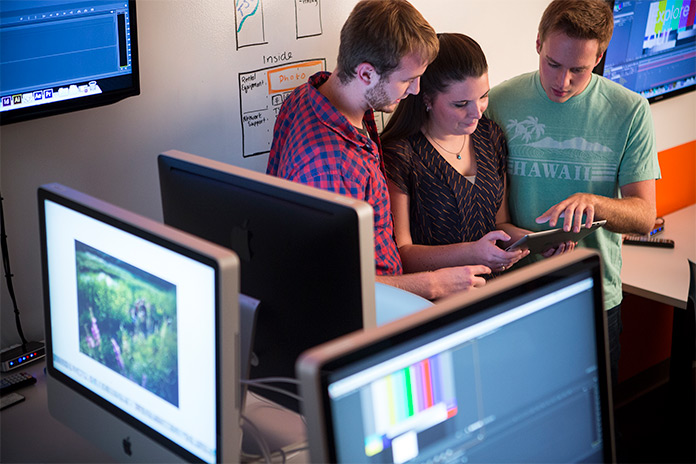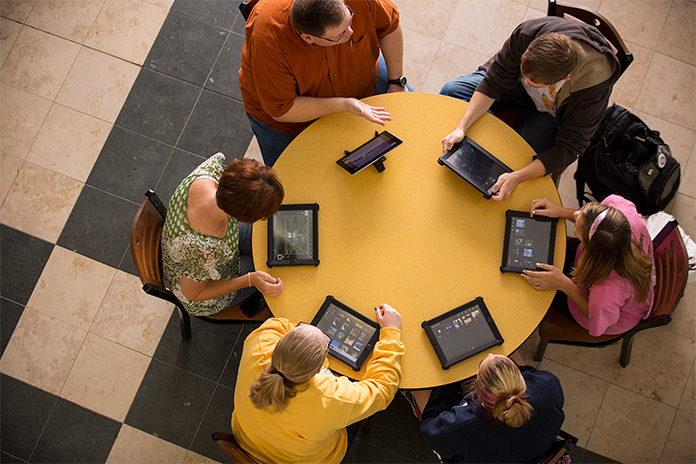


The library on any college campus is the center from which students and faculty draw information to create knowledge. As we look to Juniata’s future, Beeghly Library must not only evolve to provide many forms of information, it must host space and ideas that strengthen the ability of our community—students and faculty—to learn. The spirit of curiosity and engagement, interdisciplinarity, well-being, and citizenship come together on Juniata’s campus, and most powerfully in the intellectual heart of campus. All faculty, staff, and students use Beeghly Library. In the campaign underway for Juniata—an effort that will transform the College—it is the only project that will affect not only every Juniata student, but indeed everyone who participates in the learning enterprise at Juniata.
For millennia, libraries have resided at the core of learning, housing accumulated information accessible through the latest technological format, which, for centuries, was books. Now, the formats are a mix of digital resources, specialist networks, faculty talent, advisers and learning resources, and books. Juniata will renovate and expand Beeghly Library to include resources—among them spaces, people, and technology—that students, faculty, and staff will use to coordinate the learning enterprise.
Today’s students excel at collaboration, navigating social networks as they volunteer, gain experience, and learn. Often they arrive with learning styles and fluencies that benefit from interactive learning environments: small gathering areas, technologically enhanced spaces, video conference rooms, and the like. While one still can see students sitting alone, head bent over a book, students also shape their environment—moving tables together, huddling near an outlet where a laptop is plugged in—to suit their learning style. The renovated library will harness their spirit of collaboration and cooperation, structuring an environment where collaborative learning takes place.
In such spaces, students, faculty and staff network, engage with others and resources at distant locations, synthesize knowledge in collaborative workspaces and with assorted tools, and practice turning information into knowledge. They hone their problem-solving skills and teach one another, strengthening their own learning and helping find their passion. The context clarifies the relevance of the skills they hone and the knowledge they construct and critique.
Our faculty will sharpen their ability to guide students of varying strengths, perspectives, and interests toward success. While Juniata provides trained tutors and counselors (in addition to the faculty), they are located in various places. Our writing center and career services office exist in different parts of campus. Technology training and assistance are in another building. Undergraduate research programs are spread across departments and programs. Our vision is to bring learning resources to a single place for students.
Incorporating a learning commons in Beeghly Library will underscore Juniata’s key attribute: partnership. Our faculty partner with students in their total learning and students develop the capacity to partner with one another. The effect of such work? Learning depends less on the “sage on the stage” and more on the “mentor at the center.”
The changes made within the intellectual heart of Juniata will expand our work on how people teach and learn. Faculty will model engaged learning for students in how they interact with one another, as well as with students, in the same space. By hosting the people, spaces and technology reflective of contemporary learning and shaped by Juniata’s ethos of personalization, Beeghly Library and its learning commons will invigorate all that we do at Juniata.
| Giving Opportunities for the Library Transformation and Learning Commons | |
| Naming Opportunities for Larger Facilities and Operations | $500,000 |
| Naming Opportunities for Marquis Spaces | $250,000 |
| Naming Opportunities for Classrooms, Small Study Rooms, and Offices | $100,000 |
| Endowments for Library and Learning Commons | $50,000 |
| Naming Opportunity for the Structure Itself | $4 to $5 million |
| Other Naming Opportunities | $25,000 to $100,000 |
| Unrestricted gifts help with any endeavor. | |


Naming Opportunities for Spaces. Your support of the project can include a naming opportunity within the building itself. Given the number of functions, offices and personnel that will connect to the project, we expect naming opportunities will be numerous. We are conceptualizing the space and preparing for architectural planning. Once that is complete, we can provide a more specific sense of opportunities. For now, Juniata seeks support to help make the vision a reality.Whether small studios with smart boards and work tables, video conference facilities, open areas with moveable furniture and rolling whiteboards, or seminar rooms with video conference and recording capability, students and faculty will have ready access to spaces for projects, training, classes, or study sessions. Recent research shows how work occurs in groups and through technological interfaces, and the spaces in the learning commons will help students and faculty develop and reinforce their ability and awareness of how people learn and hone their ability to work with others.
Endowments for Operations. The library and learning commons will require resources for equipment, materials, and software above what the library presently funds for books, databases, journals, and other information sources.
As part of a revitalized Beeghly Library, the learning commons will house, in one place, the people who help students shape and understand their educational options: advisers and advising resources, peer study tables and coaching, student engagement personnel, a center for undergraduate research, career services, and more. With the Lakso Center for the Scholarship of Teaching and Learning also located within, faculty learning and development will happen in the space as well, modeling for students what engaged professional life can be. The entire operation will focus on helping students succeed in their planning, their learning, and their life after Juniata.

Whether small studios with smart boards and work tables, video conference facilities, open areas with moveable furniture and rolling whiteboards, or seminar rooms with video conference and recording capability, students and faculty will have ready access to spaces for projects, training, classes, or study sessions. Recent research shows how work occurs in groups and through technological interfaces, and the spaces in the learning commons will help students and faculty develop and reinforce their ability and awareness of how people learn and hone their ability to work with others.

In addition to expanding digital resources for research and providing more connectivity for students and faculty working on projects, new library leadership will develop learning and information resources to ensure a dynamic and contemporary intellectual space. The library’s resources can provide for students virtual work platforms to store their accumulated work where they and their faculty can see the accumulation of learning and perspective over their time at Juniata.
